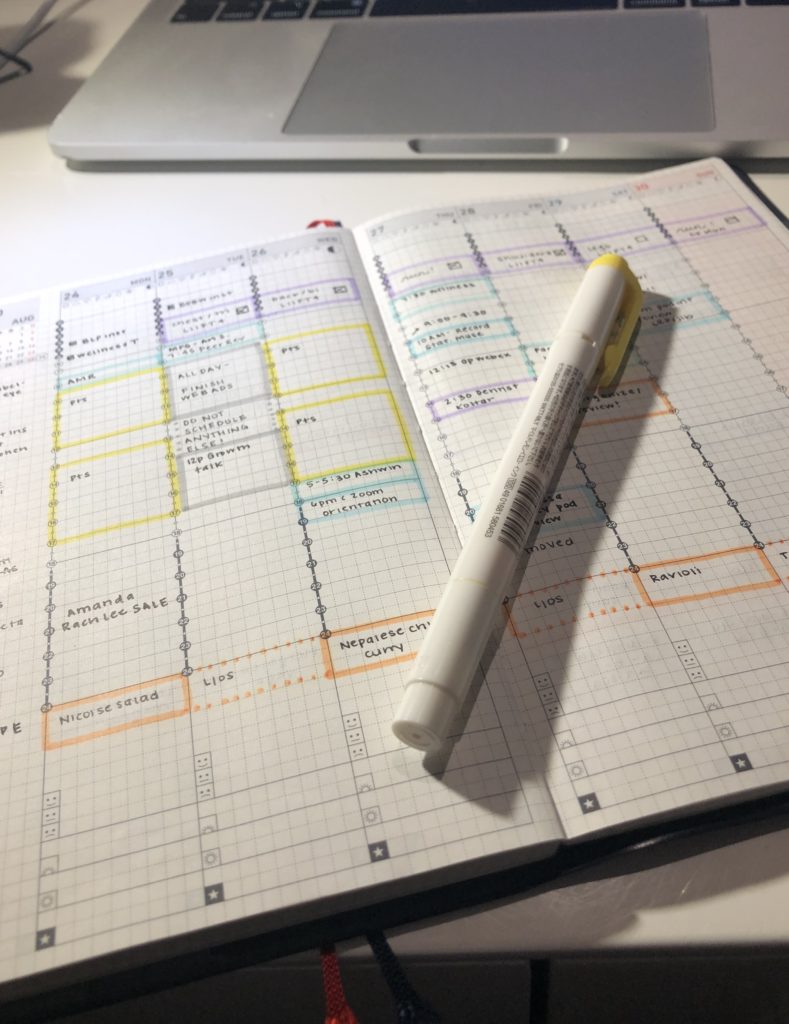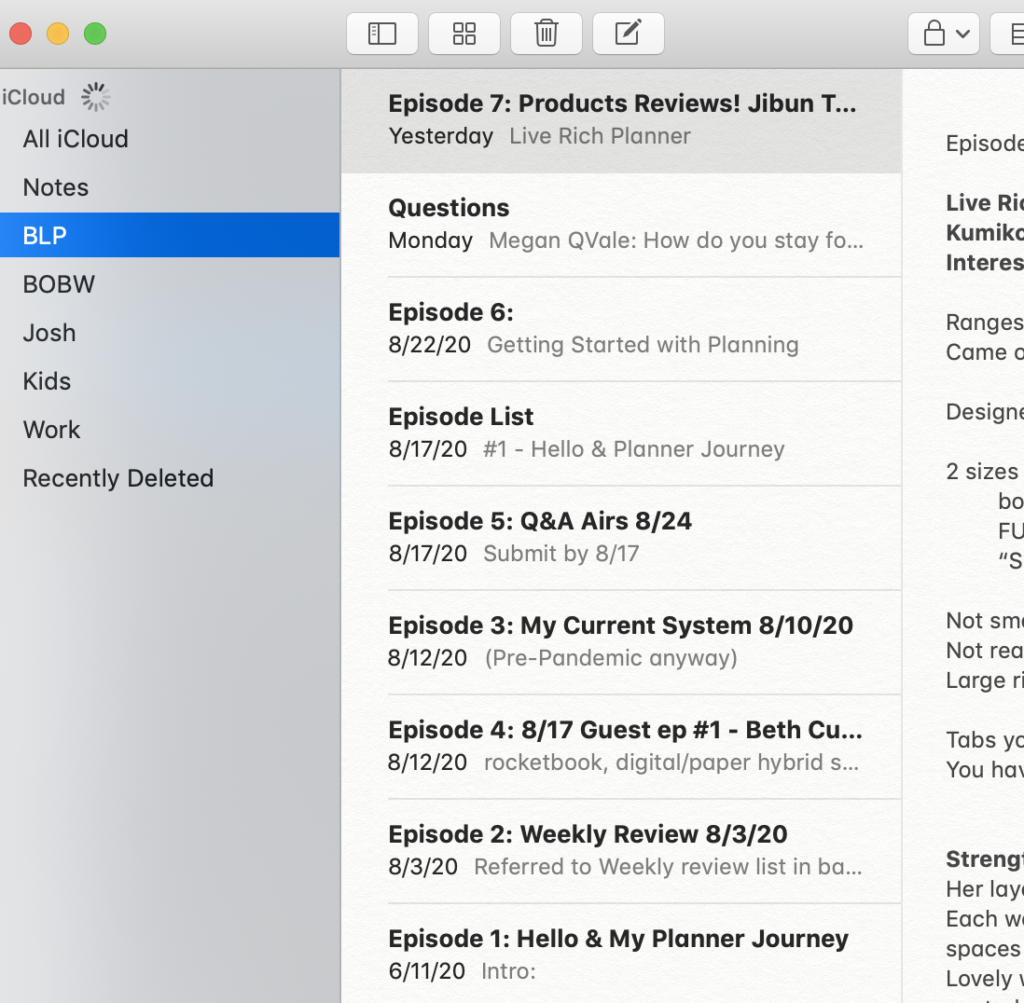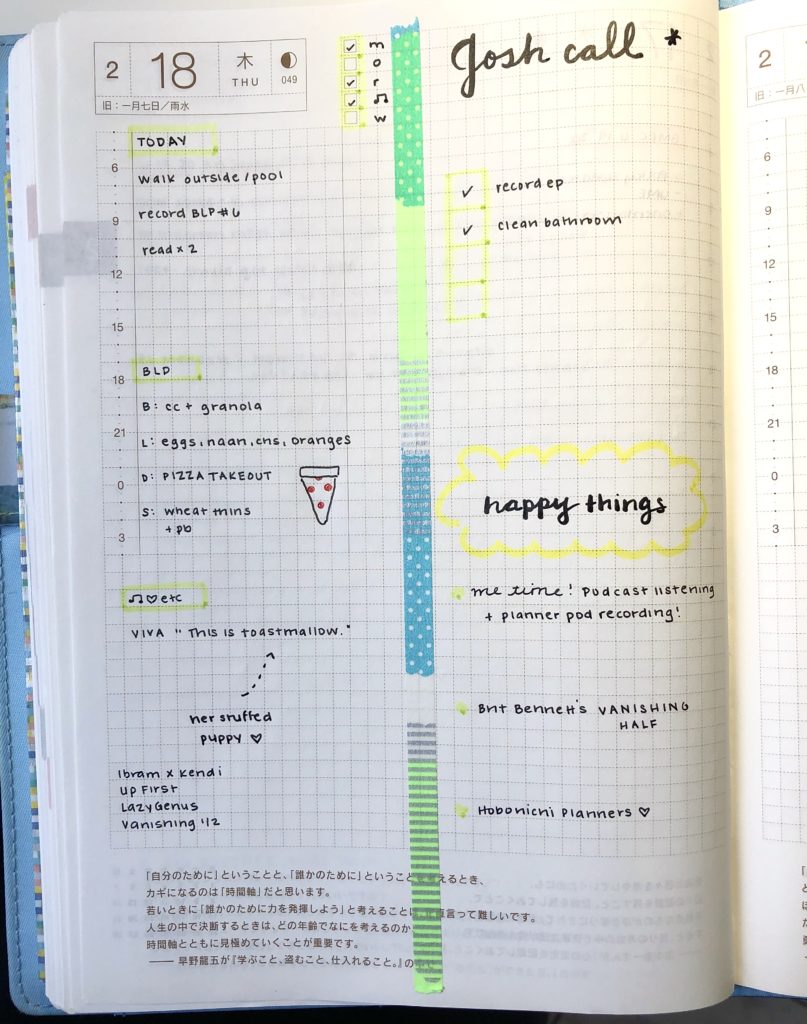It’s another Deep Dive episode!
This one was inspired by an Instagram-submitted question: “Could you create an episode about planning for those who don’t currently plan or use a planner, but are interested in doing so? How would you build a system from scratch?”
Thank you for the inspiration, listener! I really enjoyed thinking about (and talking about) the elements of a planning system that I believe are essential. In the episode, I attempted to build a framework without prescribing specifics. I hope it helps some!
Essential Elements:
1- You need a trusted calendar. Can be electronic, can be paper. But you have to have one calendar that you truly trust and contains everything of importance to help you plan your day. I prefer paper as I find it easier, better for annotation, and easy to add from various electronic sources. BUT paper is not the only way, and I know others who are google calendar, outlook, cozi, or apple calendar diehards.
If you want to go paper, your calendar system doesn’t have to be a big behemoth with daily pages. You could go very minimal and still capture all of the time-specific plans and events you need to. The B6 Jibun Techo is tiny but could hold SO much info if you needed it to (review coming in future ep!)!

2- You need a list/goals management system.
You need places to put:
- incoming tasks, ideally with a way to sort so they are not in one giant intimidating (and off-putting) list
- incoming ideas
- records of the past (only if you want to!)
- goals lists for each time frame: yearly, quarter, weekly, and even daily.
This can be built into your planner or you may need a separate system, either digital OR paper. I don’t necessarily believe all tasks need to go into one system. For example, my clinical work contains plenty of tasks that never leave the electronic medical record system. Having separate systems to capture different kinds of tasks is fine as long as you build rituals to regularly check/manage each system.
My personal combo is:
- A folder in my work email for projects that I am waiting on / following up (I go through it at minimum weekly to decide what should go on my weekly lists and to cull things that no longer are relevant)
- Apple Notes lists as kind of catchall for work and nonwork goals/ideas
- Paper lists for yearly goals / monthly goals / weekly goals / etc
- DAILY pages which contain goals & plan for day, built right into my planner (hence, hobonichi)
- Other ad hoc lists of things that are important to me (some in bullet journal . . some in Apple Notes. Example – show notes & ideas much easier to do digitally so I do – but if I want to brainstorm a bunch of new ideas I’ll typically do it on paper
I also use my bullet journal to track a number of things.
You might want to track books read. Books TO read! Events you want to plan in future. Habits. Workouts. Trips to take. TV shows to watch. Your kids’ growth.
Or, nothing. This is all about what makes you happy.
For task collection and management, I do not think there is any one right way to do this. I DO however think it needs to be intentional and you need to be aware of all of your processing “buckets”, per se. And then the key pairing with your list/goals system is the next step!!


3- You need routines that support your mission to stay organized and intentional.
When do you process inputs? To me, process means integrate inputs from calendar + various lists to create time-frame specific goals.
This is where the magic happens (in theory, anyway!). You are going to use your carefully curated inputs to design your day in an intentional way.
Maybe you “triage” at a certain time but really “process/clean up” at other times. There is no right time to do this . . . but it is important that you do it, and that you do it regularly. Otherwise the rest of your efforts are not going to really be all that helpful.
I process in some form each morning, at the end of a work day, at the end of the work week, on Sundays/Monday mornings, sometime at ends of months, quarters, and definitely at the end of each year!
As you are designing your processing routines, think about:
How do you capture those little things that come up on the go? Do you have a system to review each of these capture points?
When do you want to create/review daily plans, weekly plans, monthly plans, quarterly/quintile plans, beyond?
When do you (or do you need to) coordinate plans with others you are close to?
4- When it comes to functional planning, ALL OF THE AESTHETICS ARE OPTIONAL. I only recommend getting fancy if it makes it more fun for you to use your system (and therefore makes it more likely you will continue to do so). You do need pens that feel good and don’t smudge too much 🙂 Perhaps some colors for making pages clear or coding goals by priority. But really all of the stickers / washi / fancy layouts are optional.

5- If I were building a very basic planning KIT, what would I use?
Well – you all know I love my Hobonich products, but FOR YOU I cannot recommend any one brand! There are just so many and it really depends on how much ‘calendaring’ you want on paper vs how much space for lists. The most versatile options are a weekly planner & bullet journal (examples: a Plum Paper or Jibun Techo or Hobonichi Weeks or Simplified Weekly plus a plain notebook/dotted journal) or a binder option with inserts (blanks, etc), or yep – a Hobonichi Techo Cousin as long as you are comfortable with either using an accessory system (digital or paper) for some lists & tracking AND want a daily page.
I would add to my “kit” some great black pens (tastes vary but I’m currently using a Pentel Energel and a fine point Pilot G-2; I use a Uni Jetstream / Sakura Pigma Micron / Uni Pin on Hobonichi paper). And Mildliners. Every planner needs Mildliners!
Plus, optional: maybe a couple of washi tapes & versatile stickers to make it fun
LOVE OF THE WEEK
Amanda Rach Lee washi tape & dotted journal! Yep, I ordered them (for research purposes of course . . . ) so a full review will come later 🙂
NEXT WEEK – guest ep coming your way! Stay tuned. And if you have an extra few seconds today, please leave a review!

9 Comments
Such an interesting topic!
I use two calendars, but there is a clear distinction. If I need to be aware of it during the work day, it must go in the work calendar (personal calls I need to make during business hours, doctors appointments, evening commitments if they require me to leave on time), and anything outside of that goes into the personal calendar. If I lost track of things, I imagine I would want to combine them, but this works for me. I also separately do weekend calendar planning on a white board with weekends listed out in order and spaces to be filled in, and a list of things I want to fit into those spaces. Very fun.
My biggest challenge with the planning process is definitely #3! I’m pretty good at not dropping anything major because I do reviews of what I need to do on my projects, etc, and I immediately do actions after meetings / end of day or add them to my calendar for the next day. But my system for new tasks in my email is to mark them unread if I need to do something / look again later, and I do NOT regularly go through and clear that out. Again, nothing super major is likely to be missed, but I have all these little tasks that I don’t seem to find the time or energy to clear out. Does this mean that I am basically just deciding not to do the task? Maybe. I do look back through unreads every so often and do some tasks, so perhaps I’m deciding that I will decide later whether to do the task. I welcome more advice on this! Makes me think of Laura’s saying about expectations being infinite and time being finite.
Yep, you’re probably deciding not to in a way. Some people really don’t like to decide not to do things (my husband is like that!) but I personally find it more stressful to have lots of things dangling out there in a nebulous ” gonna do at some point but completely undefined ” category!!
Great episode! Thank you for the very specific recommendations. I listened to the episode while taking a walk, but I’m going to re-listen and take some notes. I have a copy of David Allen’s GTD book and have not made the time to read the whole thing, but I like that you outlined its most useful parts (it seems like) with a personal twist. My challenge is that I record notes and to-do’s in too many different places, some of which I don’t regularly, or ever, check. My memory is pretty good so I tend to remember most tasks, but the mental load of these “open loops” is not great.
I just had my second kid a couple of months ago, and will be going back to work in a few more weeks, and I have a feeling that my current system will be quite strained. This has been a great time to reassess my planning and review habits and figure out how to enhance them. So your podcast couldn’t be better timed!
And I think I’m going to try a bullet journal instead of a regular planner, and I’m thinking of using the RocketBook for this journal! I learned about it through your podcast. I take copious notes at work meetings, and I like the idea of keeping all my daily plans, longer-term lists and notes in one place. It looks like with the Rocketbook, you can keep some content, like annual goals and lists of books to read, semi-permanent, while transferring and erasing the other content regularly.
Wow! YES to the idea of not having a bunch of open loops about where your tasks are. I find that incredibly stressful too!! You will have to let me know how the Rocketbook goes!!!
Thanks for your reply! I realized upon some further self-reflection that my memory is probably not even very good, I probably just don’t realize what I’m forgetting!
I love your podcast so much, it makes me look forward to Mondays!
I have long been obsessed with planners but this is the first year I have found a system (Kokuyo Campus B5 26 ring with a mix of Day Designer, Passion Planner, and DIY inserts) that meets all my needs. Your podcast helped me realize why it’s working so well — it ticks all the boxes.
Re: black pen — I recently discovered the Pilot Juice Up. The standard size is .4 but it also comes in 0.3. The fine tip makes it perfect for planning, I think!
Thanks for the amazing content! Love it!
Wow sounds like an amazing custom system!!!
I find this so interesting! Thank you for this! I enjoy planning and goal-setting, but I didn’t know such a comprehensive world of planning tools existed prior to listening to your podcast. I usually just use a combo of Google calendar/Google docs/notes on my phone. What I find challenging at this phase in my life is that there is a relatively high amount of unpredictability (two kids under age 3, residency with varying workload and responsibilities from one rotation to another). I need to work on making realistic goals and to-do lists in this context. I often end up with a long, unattainable list that I don’t ever get through. Most weeks I don’t get through everything I want to get through, but I know that’ll be the case ahead of time, I just tell myself to *try* to do all the things.
I’ll be curious to hear what you think of the dot planner that you bought. I have a Leuchtturm1917 which I like but am open to new ideas, especially one made by a small business owner! My bullet journals last me about 2 years since I don’t do a ton of spreads right now but I think that will change in a couple of years when I”m out of the baby/toddler phase. I used to plan way more but have majorly scaled it back and I don’t have kid activities to keep track of yet!